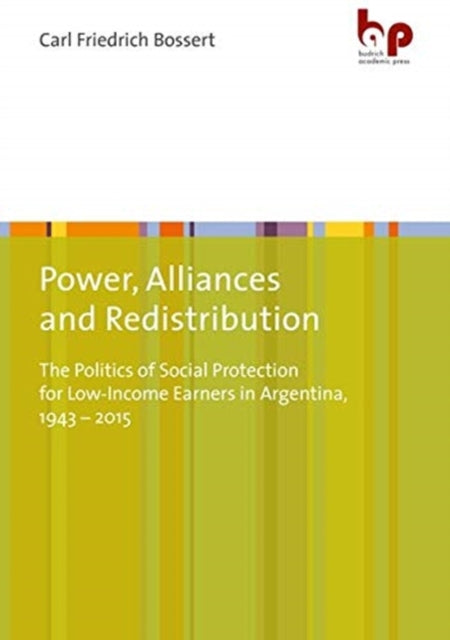Carl Friedrich Bossert
Power, Alliances, and Redistribution - The Politics of Social Protection for Low-Income Earners in Argentina, 1943-2015
Power, Alliances, and Redistribution - The Politics of Social Protection for Low-Income Earners in Argentina, 1943-2015
YOU SAVE £17.67
- Condition: Brand new
- UK Delivery times: Usually arrives within 2 - 3 working days
- UK Shipping: Fee starts at £2.39. Subject to product weight & dimension
Bulk ordering. Want 15 or more copies? Get a personalised quote and bigger discounts. Learn more about bulk orders.
Couldn't load pickup availability
- More about Power, Alliances, and Redistribution - The Politics of Social Protection for Low-Income Earners in Argentina, 1943-2015
Latin America is the most unequal continent in the world, with resource-intensive social systems doing little to change the social imbalance. This study examines the long-term development of social security for low-income earners in Argentina and analyzes the decisive political, social, and economic factors influencing it.
Format: Paperback / softback
Length: 374 pages
Publication date: 19 April 2021
Publisher: Verlag Barbara Budrich
Latin America is widely recognized as the most unequal continent globally, a paradoxical reality given the development of resource-intensive social systems that have yet to significantly address the enduring social imbalance. In this insightful exploration, the author delves into the core of this paradox by examining Argentina as a case study, uncovering the intricate conflicts of power and interests that shape its social landscape. Through meticulous analysis, the author identifies effective strategies for implementing inclusive policies that can address the deep-rooted inequalities prevalent in the region. This groundbreaking study stands as the first of its kind, systematically examining the long-term development of social security for low-income earners in Argentina and analyzing the critical political, social, and economic factors that have influenced this critical aspect of society.
The author begins by highlighting the stark disparities in income and wealth across Latin America, with the region's richest countries often boasting per capita incomes that surpass those of many European nations. This inequality is exacerbated by factors such as historical legacies of colonialism, exploitation, and discrimination, which have left lasting scars on the social fabric. The development of resource-intensive social systems, on the other hand, has provided opportunities for upward mobility and improved living standards for some segments of the population. However, these systems have also perpetuated existing inequalities, as they have often benefited the wealthy and marginalized the poor.
One of the key findings of the study is the persistence of social exclusion and inequality in Latin America, despite the apparent progress in economic development. The author argues that this paradox can be attributed to the concentration of power and resources in the hands of a small elite, who use their influence to maintain the status quo and resist policies that promote social inclusion. This power imbalance is further reinforced by the lack of effective governance, corruption, and weak institutions, which fail to hold those in power accountable and ensure the distribution of resources in a fair and equitable manner.
To address these challenges, the author proposes a range of strategies for implementing inclusive policies in Latin America. These include promoting social mobility through education and job training programs, increasing access to healthcare and social services, and implementing policies that redistribute wealth and reduce income inequality. The author also emphasizes the importance of promoting political participation and engagement, as well as fostering a culture of social responsibility and accountability among individuals and institutions.
In conclusion, Latin America faces a profound paradox of unequal development, where resource-intensive social systems have done little to address the enduring social imbalance. This study provides valuable insights into the underlying conflicts of power and interests that shape the region's social landscape, and offers practical strategies for implementing inclusive policies that can promote social inclusion and reduce inequality. By addressing the power imbalance and promoting effective governance, Latin America can build a more equitable and prosperous future for all its citizens.
Weight: 548g
Dimension: 148 x 209 x 36 (mm)
ISBN-13: 9783966650281
This item can be found in:
UK and International shipping information
UK and International shipping information
UK Delivery and returns information:
- Delivery within 2 - 3 days when ordering in the UK.
- Shipping fee for UK customers from £2.39. Fully tracked shipping service available.
- Returns policy: Return within 30 days of receipt for full refund.
International deliveries:
Shulph Ink now ships to Australia, Belgium, Canada, France, Germany, Ireland, Italy, India, Luxembourg Saudi Arabia, Singapore, Spain, Netherlands, New Zealand, United Arab Emirates, United States of America.
- Delivery times: within 5 - 10 days for international orders.
- Shipping fee: charges vary for overseas orders. Only tracked services are available for most international orders. Some countries have untracked shipping options.
- Customs charges: If ordering to addresses outside the United Kingdom, you may or may not incur additional customs and duties fees during local delivery.


